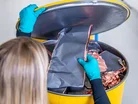BMW Tackles Scope 3 Emissions with Closed-Loop Recycling

BMW is making strides toward sustainability by establishing its Cell Recycling Competence Centre (CRCC) in Lower Bavaria.
The innovative facility is at the forefront of transforming battery recycling, addressing multiple Scope 3 emission categories, and driving the company's commitment to a circular economy.
Markus Fallböhmer, BMW's Senior Vice President of Battery Production stated, "The new Cell Recycling Competence Centre brings another element to our in-house expertise: From development and pilot production to recycling, we are creating a closed loop for battery cells, taking advantage of the short distances between our Competence Centres in Bavaria."
Scope 3 categories
BMW's CRCC utilises a groundbreaking "direct recycling" process, which eliminates the need for energy-intensive chemical or thermal recycling methods.
- Category 1 | Purchased Goods and Services The CRCC's recycling process reintegrates recovered battery materials directly into production, reducing dependency on raw materials. By decreasing the need for virgin resources, the company is lowering costs.
- Category 4 & 9 | Upstream Transportation and Distribution Strategically located in Lower Bavaria, the CRCC optimises logistics by minimising transport distances between BMW's facilities. It reduces the emissions generated during the transportation of materials and components.
- Category 5 | Waste Generated in Operations By design, the facility recycles significant amounts of material—up to mid-double-digit tonnes annually. The initiative not only reduces waste but ensures that valuable resources are reused efficiently.
- Category 11 | Use of Sold Products Creating a closed-loop recycling system enhances the sustainability of BMW's EVs throughout their use phase. The recycled materials contribute to producing new battery cells, reducing the environmental impact of EVs.
- Category 12 | End-of-Life Treatment of Sold Products The CRCC addresses the entire lifecycle of BMW's products by processing high-voltage batteries into reusable resources. The approach turns end-of-life batteries into an asset rather than waste.
Sustainable infrastructure
The CRCC is not just about recycling batteries—it showcases sustainable infrastructure.
The facility incorporates energy storage systems and photovoltaic installations, reducing its operational carbon footprint.
By avoiding traditional energy-intensive recycling methods, the CRCC sets a new benchmark for efficiency and environmental responsibility.
Circular economy principles
BMW's efforts align closely with its circular economy strategy, focusing on four core principles:
- Re:Think: Innovating sustainable solutions.
- Re:Duce: Minimising resource consumption.
- Re:Use: Extending the lifecycle of materials.
- Re:Cycle: Closing the loop for critical resources.
"Direct recycling will help reduce the costs for our battery cell pilot line."
By leveraging the CRCC, BMW reduces waste, conserves resources, and enhances efficiency, collectively decreasing its environmental impact across multiple Scope 3 categories.
Sustainable mobility
BMW's Cell Recycling Competence Centre exemplifies how innovative recycling can support a sustainable future for electric mobility.
With its closed-loop system and focus on minimising emissions, the CRCC strengthens BMW's position as a leader in sustainable automotive production.
Markus concludes, "From development and pilot production to recycling, we are creating a closed loop for battery cells," reinforcing BMW's commitment to driving sustainable innovation across its entire value chain.
Make sure you check out the latest industry news and insights at Scope 3 Magazine
and be part of the conversation at our global conference series, Sustainability LIVE and Procurement & Supply Chain LIVE.
Discover all our upcoming events and secure your tickets today. Subscribe to the Scope 3 Magazine newsletter.
Scope 3 Magazine is a BizClik brand.
- Fighting E-Waste: Circular Electronics Drive SustainabilityCircular Economy
- Evia Aero and Britten-Norman Address Scope 3 EmissionsTransportation & Logistics
- Global Scope 3 Emissions: A Corporate Sustainability ShiftScope 1 2 and 3
- IKEA Preowned Launches to Tackle Scope 3 EmissionsCircular Economy
